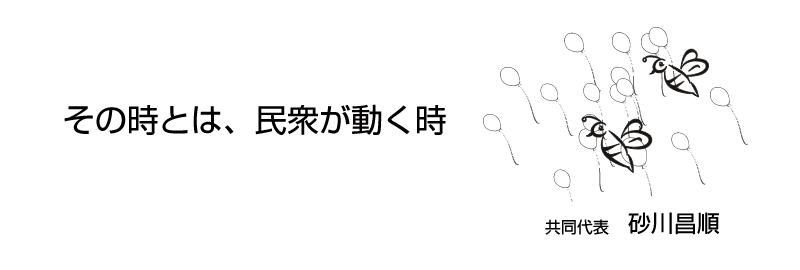
Message from the joint representative
When history moves is
when the people move.
SUNAGAWA, Shojun
Joint Representative
NO FENCE
(Association for the abolition of concentration camps in North Korea)
Concentration camps such as the Nazi Auschwitz camp and gulags in the former Soviet Union have been abolished. In North Korea, however, labor camps of this nature still exist today. The truth about such camps has been coming to light lately. Human rights activities and other organizations in many countries have been investigating and reporting their findings. People who have miraculously escaped from the camps and managed to flee from North Korea have begun to speak out. Evidence and testimonies have been collected and verified, and the locations of the camps have been confirmed with satellite pictures.
In South Korea, the action group for the demolition of detention centers for North Korean political prisoners is leading the campaign to abolish the concentration camps, and such movement is gaining momentum also in other countries. In response to the growing international movement, finally in Japan, too, a nationwide organization was established solely for the purpose of pursuing the abolition of concentration camps in North Korea. I am deeply ashamed to have to say "finally" when I reflect on myself as a human being.
We have decided that the name of this association be "NO FENCE," meaning "No Fence in North Korea." Simply put, it is an organization that will take action to eliminate the concentration camps in North Korea.
The campaign should have certain achievements amid the international groundswell. How will this, then, change the perception of human rights held by each individual Japanese? For the future children of Japan, for further development of friendly relationships with both Koreas and for demonstration of Japan's stance on human rights issues to the international community, we are determined to strive for the abolition of the concentration camps.
I hope that someday, I will walk across the 38th parallel with a million South Koreans in a demonstration march. When that happens, I will carry even a kilogram of rice in my backpack and deliver it to the people in the North. One kilogram supplied by each of a million people would total 1,000 tons. We earnestly wish to take the food to those prisoners who are nearly starved to death in the concentration camps at the earliest possible opportunity.
In the fall of 1989, I was in Germany. In small gatherings of people who advocated the unification of East and West Germany, those who considered escaping to West Germany and others who insisted on staying and fighting in East Germany, I was, too, dreaming of the day that ought to come. I will not forget that, before long, those small groups of people joined together into a demonstration march of a million citizens.
History has always proved the victory of the populace. Sometimes, politics makes history. The common people, however, have changed history and made revolutions. When history moves is when the people move.

